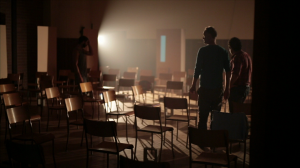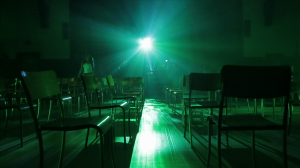 At the Russian Hall until August 4
At the Russian Hall until August 4
www.brownpapertickets.com
Posted August 3, 2013
Critics don’t always agree – and that’s a good thing – but there’s one thing the committee that decides the Critics’ Choice Award for Innovation does agree on: innovation isn’t enough if the piece doesn’t ‘work’.
der Wink will present a challenge for us (Colin Thomas, Jerry Wasserman, Mark Leiren-Young and myself) when we meet next spring. This Leaky Heaven production, directed by Steven Hill, is undoubtedly innovative.
Old wood-and-metal chairs are lined up in row after row in the old Russian Hall auditorium. The lines are precise and the chairs all face different directions with about a meter of space around each one. One light at the north end and one at the south end breaks what is otherwise in shadow.
der Wink begins in a beautifully meditative state: sounds of water lapping, rain falling, distant thunder and then the sounds of boat whistles – deep and sonorous and all at different levels, sometimes harmonious, sometimes discordant. And foghorns. I could have lived in that place for longer.
 And then the players enter: Alex Ferguson, Nneka Croal, Sean Marshall Jr. and Baraka “Kiki’ Al Rahmani. From the east and west side, near the floor, orange lights light up and the players being sliding into place large pieces of cardboard – like 4 x 8 pieces of plywood. They begin carving the space up; we find ourselves in smaller ‘boxes’. Some of the pieces have a cut out window where we see and hear a conversation: a man and a woman quarreling, a woman at a kitchen sink, a woman speaking Arabic (?) in an argumentative voice on the phone. More dialogue some of it inaudible. The cardboard pieces are constantly being moved into different configurations.
And then the players enter: Alex Ferguson, Nneka Croal, Sean Marshall Jr. and Baraka “Kiki’ Al Rahmani. From the east and west side, near the floor, orange lights light up and the players being sliding into place large pieces of cardboard – like 4 x 8 pieces of plywood. They begin carving the space up; we find ourselves in smaller ‘boxes’. Some of the pieces have a cut out window where we see and hear a conversation: a man and a woman quarreling, a woman at a kitchen sink, a woman speaking Arabic (?) in an argumentative voice on the phone. More dialogue some of it inaudible. The cardboard pieces are constantly being moved into different configurations.
But I was not moved. I was confused.
Sure, I could imagine der Wink was about living in high density where neighbours hear neighbours. About how, despite our proximity to each other we remain isolated. But it was mostly conjecture on my part. The sound in that space is mushy and poor and so when Alex Ferguson solemnly intones, “It is right in this time of lamentation to pay tribute” . . . I did not hear to what or to whom are we paying tribute.
There are some moments of pure beauty here: a lighting cue that forms a greenish ‘pyramid’ that floats over us like a mossy tent; a melancholy ballad on a ukulele; and an extended scene in which the performers wandered amongst us asking forgiveness, “I forgive you for not really talking to me lately”, “I forgive you for locking me out of the house when I was eight”, “ I ask your forgiveness for – nothing”, “I forgive you guys for all that crazy”. . . and then I didn’t hear the rest.
And then no one knew when it was over. We sat there until some brave soul asked if it was over. “Yeah, it’s the end.” Embarrassment on both sides.
Innovative? Certainly. But confusing. What the critics’ committee will be asking is, “Did it work?” For me, not enough of the time.


